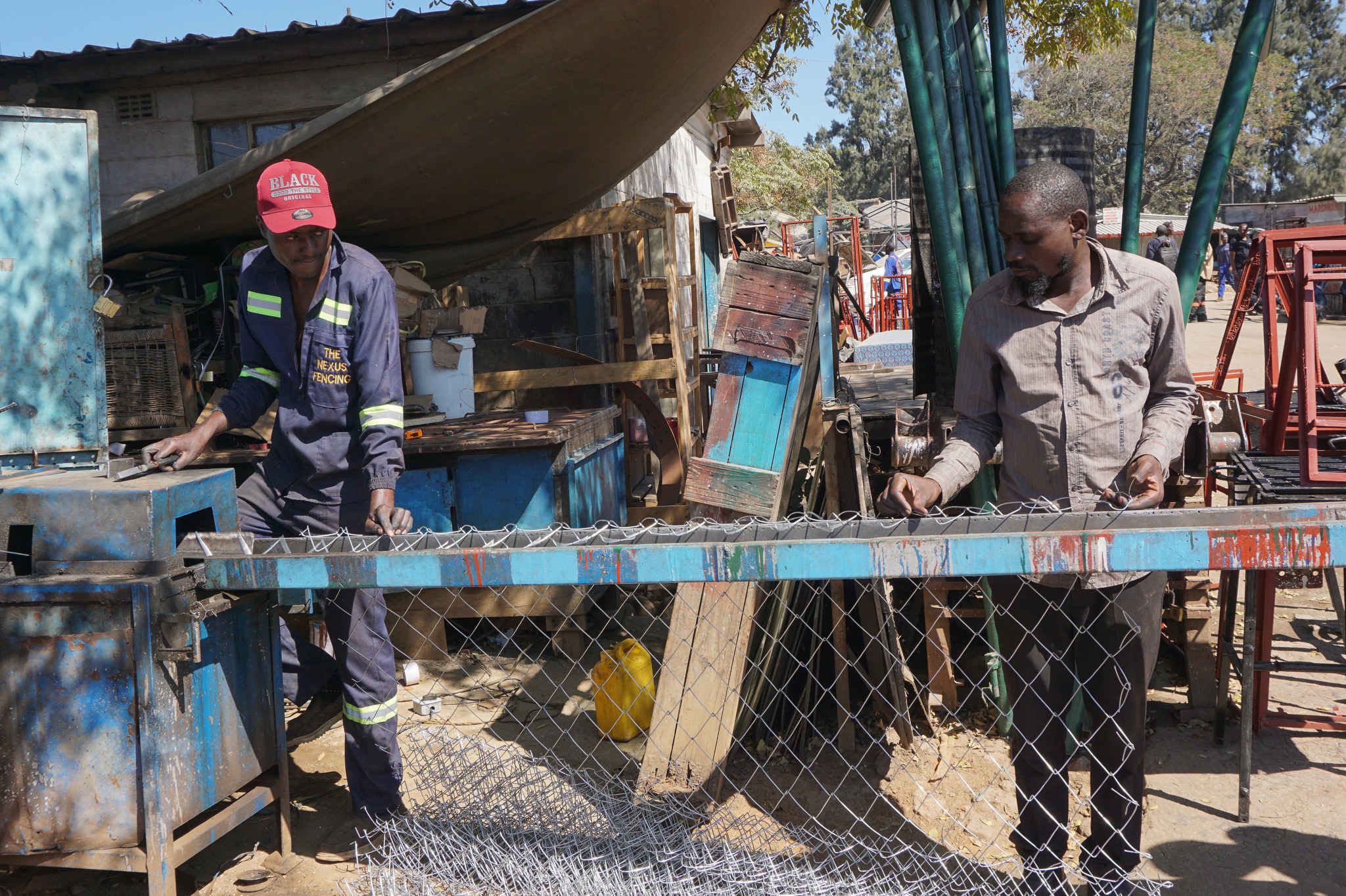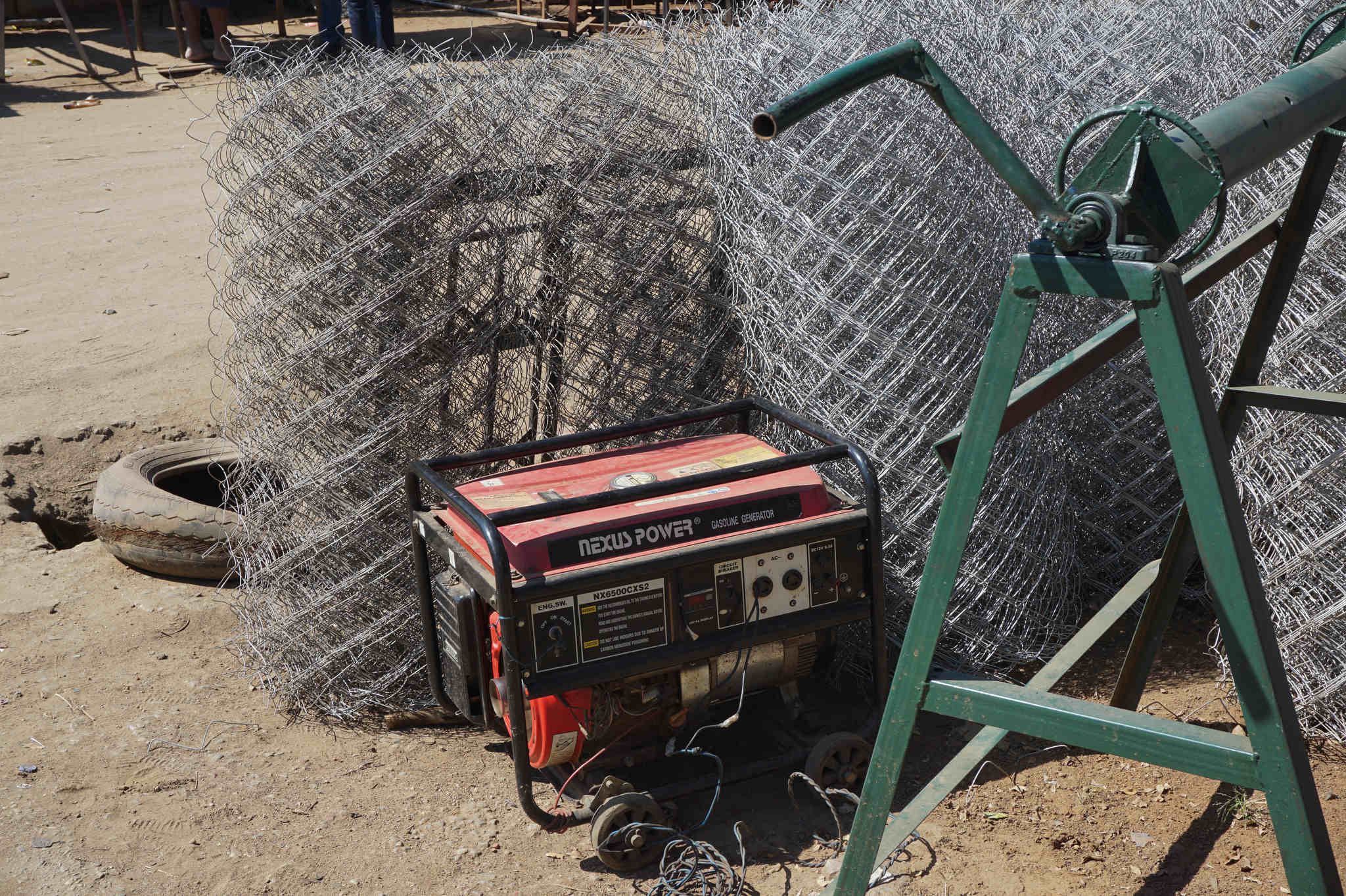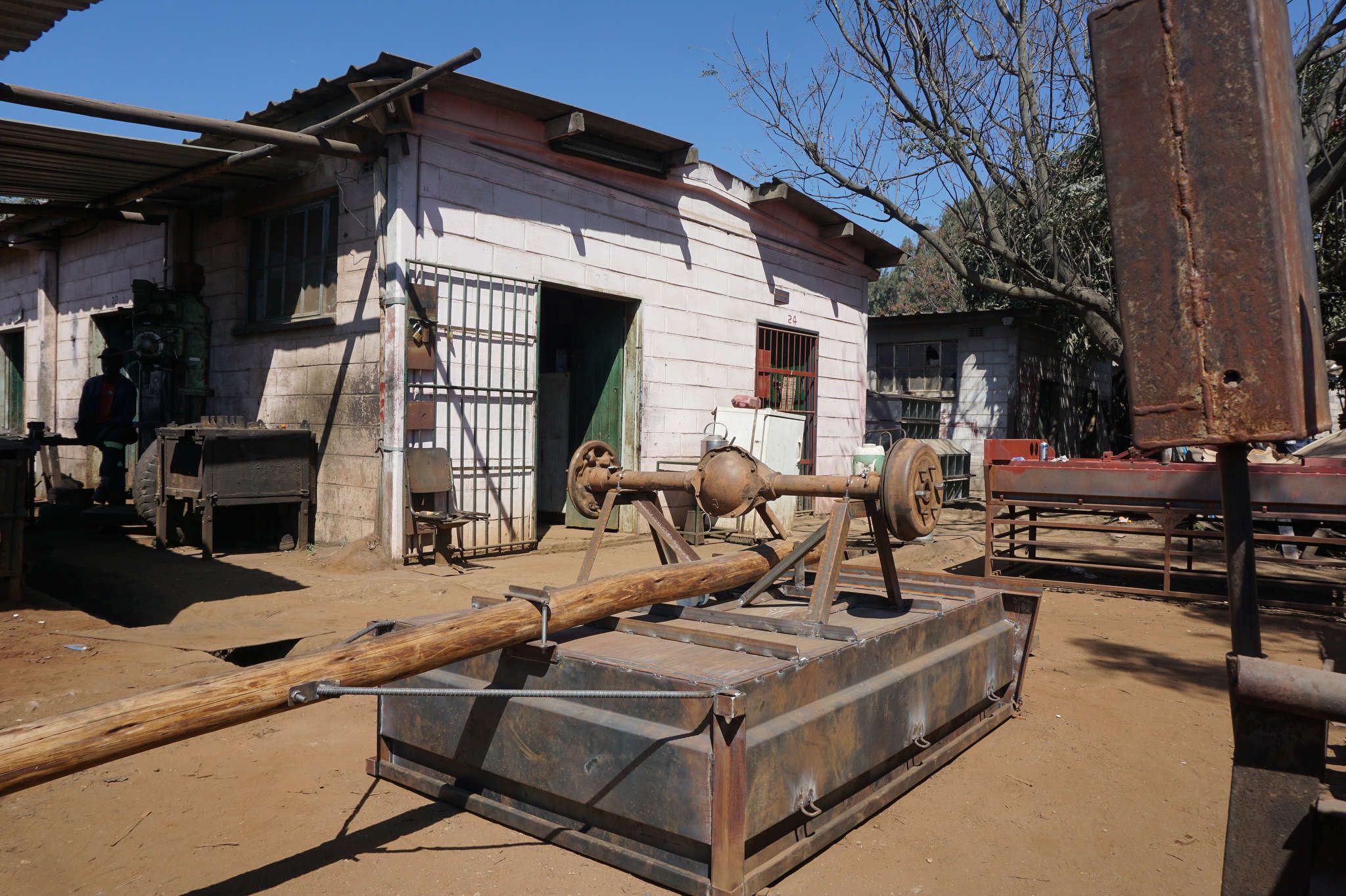
Evidence Chenjerai, GPJ Zimbabwe
Andrew Ngondonga, a small-business owner since 1983, checks on projects around his metal fabrication shop in Mutare. Prolonged electricity cuts have forced Ngondonga and his staff to work without power during the day and, if the power comes back, through the night to complete orders.
MUTARE, ZIMBABWE — Andrew Ngondonga paces up and down the cramped office in his metal fabrication shop at Murahwa Green Market in Mutare. Outside, groups of men clad in work suits mill around the yard. Normally the din of machinery from the shop and others nearby is so loud you can’t hear yourself think. But on this day, there’s only the occasional buzzing noise in the distance as nearby businesses turn their generators on and off to start and finish tasks.
Ngondonga’s metal fabrication shop has been without power for two days. And without power, his employees can’t work. Some do minor touch-ups that do not require electricity. Others just play cards and board games and hope the electricity is restored soon. Production is down, he says.
Ngondonga is among thousands of small- and medium-business owners trying to cope with Zimbabwe’s electricity load shedding — prolonged power cuts that run for 18 hours or more per day with some days having no power at all. The Zimbabwe Electricity Supply Authority uses electricity load shedding to evenly distribute available electricity during a power crisis caused by low electricity generation. Zimbabwe has been undergoing its most recent round of power cuts since 2019, but the outages have become more frequent and erratic since the end of last year. Businesses of all sizes are struggling to adapt by scheduling more shifts at night when there’s more likely to be power and, if they can afford it, investing in alternative power supplies such as generators. But those changes also come with challenges, such as insecurity and unaffordable fuel.
Ngondonga’s small engineering and metal fabrication business makes scotch carts, borehole water tank stands and vehicle trailers. But without reliable access to electricity, he is losing thousands of dollars a week, he says. The type of heavy-duty generator suitable for his business would cost about 32,000 South African rand (about 1,778 United States dollars). And the nearly 20 liters of diesel required to power the generator for one day alone would cost about 33 U.S. dollars. It’s unaffordable for him, he says.
Before the power cuts, his shop could make a scotch cart in a week. With the cuts, it takes workers two to three weeks. The shop used to earn about 1,500 U.S. dollars a month on average but now brings in only about 500 U.S. dollars a month. When the end of the month approaches, Ngondonga wonders how he’s going to pay his employees.






“I feel for my employees because in this small-scale sector, we eat what we kill,” he says.
Harvest season, the current season, should be a peak time for his business, Ngondonga says. Farmers have money from their harvest sales and want to buy machines and equipment to prepare for next year. But without electricity, he can’t produce enough to meet their needs.
“There are a few minor touches that can be done without electricity, but the bulk of the work requires electricity,” says Ngondonga.
The state-run Zimbabwe Power Company operates five stations that generate Zimbabwe’s electricity: a hydroelectric station at the Kariba Dam, the Hwange Thermal Power Station and three minor coal-fired stations. The country also imports some of its electricity from South Africa, Zambia and Mozambique. South Africa, however, is experiencing even worse load shedding than Zimbabwe. Zambia and Zimbabwe share the power generated at Kariba Dam.
All of the coal-fired stations need maintenance and stop frequently or are not producing at all. According to a report published by the Zimbabwe Power Company, because of old and broken equipment at the Hwange Thermal Power Station and a lack of foreign currency to import electricity, the company didn’t produce enough energy in 2022. The report also revealed that lower water levels in Lake Kariba led to less power generation and an increased need for load shedding.
The Zimbabwe Power Company and Soda Zhemu, minister of Energy and Power Development, could not be reached for comment.
Last December, Zhemu gave a statement to Parliament in response to criticism of the power cuts. Like the power company’s report, he cited old equipment and low water levels as some of the barriers to energy production. In November, he said, the Zambezi River Authority advised the Zimbabwe Power Company to shut down, resulting in the loss of 70% of the country’s power supply. Zimbabwe and Zambia agreed to keep running the Kariba Power Station at a lower capacity rather than shut it down, resulting in a power deficit of over 500 megawatts. And independent producers were producing less because there wasn’t enough coal, Zhemu told Parliament.



Kurai Matsheza, president of the Confederation of Zimbabwe Industries, says that despite some improvements, businesses have already suffered significantly from the power cuts.
“Production time was lost, and businesses went into losses that they will need to recover from,” he says.
The confederation has yet to conduct formal research into the impact load shedding has had on the economy.
In search of lasting alternatives, Matsheza says some bigger businesses are looking into investing in solar plants. The government, he says, should provide subsidies to encourage households and businesses to set up solar systems as a sustainable short-term and even long-term solution.
Many businesses are still recovering from coronavirus lockdown regulations, he says. They cannot afford to buy generators and run them all day.
To stay afloat, most small-business owners now operate at night when electricity is available. Those who can afford to use backup generators say that option is not sustainable because it eats into their profits.
Phibion Mabhutsu, of Nexus Fencing, says he uses at least 5 liters of fuel to power his generator for five to seven hours, costing 8 U.S. dollars. The diesel generator, however, does not run continuously.
“If we run the generator the whole day uninterrupted, we would require 15 to 20 liters fuel daily, which becomes unsustainable,” says Mabhutsu, who has been in the fence-making business for five years.
Before load shedding, the company made at least three times the amount of mesh fencing in a day shift than workers are able to make now by working night shifts and using a generator during the day, he says.



Isaac Gwayakwaya, 34, who works at his family’s metal fabrication business, says he and his colleagues used to work eight-hour shifts together during the day. Now they stagger shifts and work at night because there is more likely to be electricity between 10 p.m. and 2 a.m.
“We had to adapt and schedule our work accordingly or else we won’t have money for rentals and salaries come end of the month,” Gwayakwaya says as he paints a borehole water tank stand.
Ngondonga, however, says working at night has its risks. He says robberies have become more frequent at Murahwa Green Market, the industrial hub where his business has been located since 1983.
“Businesses are losing stock and finished products to thieves who take advantage of the darkness to steal,” he says.
Employees working night shifts are too busy to notice thieves, and it’s difficult for the private security guards to monitor the workshops at night, Ngondonga says. He has stopped keeping all of his equipment at the main storehouse because he fears it will be stolen.
Ngondonga says he hopes the power crisis ends soon. Otherwise, he says, he will be forced to downsize from the four employees he currently has.
“We need to stay afloat and hope the electricity situation is addressed. We have employees and families who depend on us,” he says.
Evidence Chenjerai is a Global Press Journal reporter based in Mutare, Zimbabwe.






